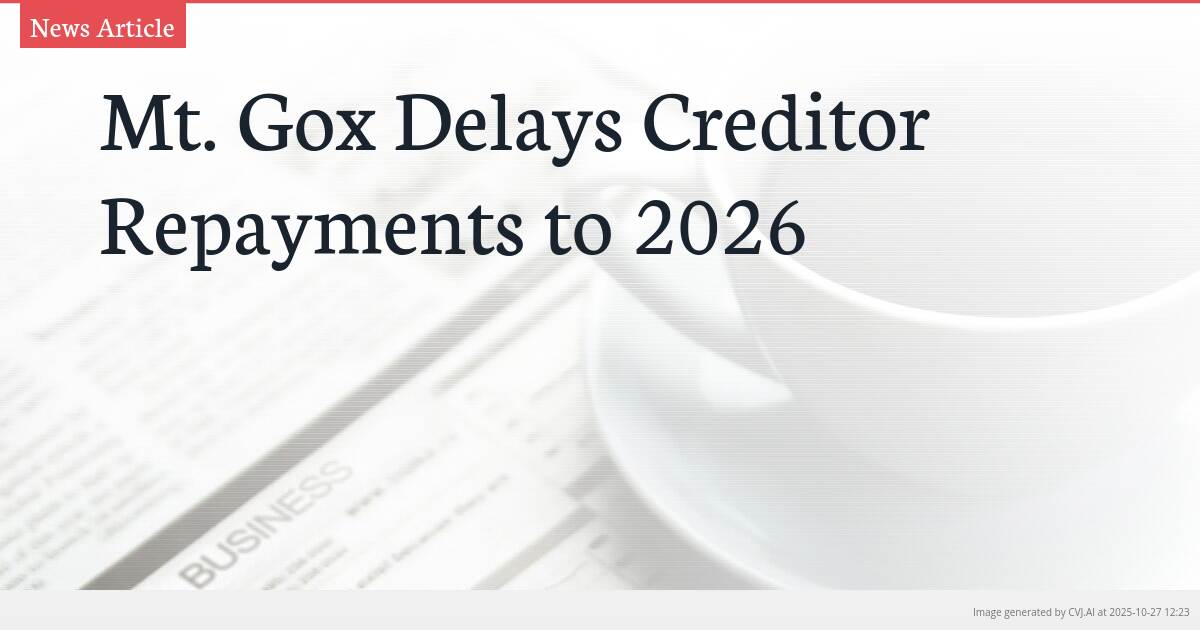This summary text is fully AI-generated and may therefore contain errors or be incomplete.
Introduction
The defunct cryptocurrency exchange Mt. Gox has once again postponed long-awaited repayments to creditors, pushing the deadline to October 2026. This marks another significant delay in the decade-long saga of compensating victims of one of crypto’s most notorious collapses. The announcement came just days before the previous October 2025 deadline was set to expire, extending the painful wait for thousands of Bitcoin holders who lost their assets in the 2014 collapse.
Key Points
- Repayment deadline extended from October 2025 to October 2026, just four days before the previous deadline
- Trustee confirms most base, early lump-sum, and intermediate repayments completed for properly documented creditors
- Many creditors still awaiting funds due to incomplete procedures and documentation issues
Another Year of Waiting for Creditors
Mt. Gox, once the world’s largest Bitcoin exchange, has extended its creditor repayment deadline by another full year to October 31, 2026, according to a Monday announcement that came just four days before the previous October 31, 2025 deadline. This latest postponement represents another chapter in the prolonged recovery process for victims of the 2014 collapse that saw approximately 850,000 Bitcoin lost. The Japan-based exchange, which handled over 70% of all Bitcoin transactions at its peak, has been mired in bankruptcy proceedings for over a decade, making this delay particularly frustrating for creditors who have waited years for compensation.
The trustee overseeing the bankruptcy proceedings cited incomplete creditor procedures as the primary reason for the extension. While the announcement confirmed that most base, early lump-sum, and intermediate repayments have been completed for creditors who filed the necessary paperwork, many others remain unpaid due to documentation issues and procedural complications. This pattern of delays has become characteristic of the Mt. Gox bankruptcy case, which has seen multiple deadline extensions since the exchange’s collapse over ten years ago.
Progress Amid Continued Setbacks
Despite the latest setback, the trustee’s announcement indicates some progress in the repayment process. The confirmation that most base, early lump-sum, and intermediate repayments have been completed for properly documented creditors suggests that the administrative machinery is functioning, albeit slowly. However, the fact that many creditors still await funds highlights the complexity of resolving one of cryptocurrency’s most significant bankruptcy cases.
The repayment process has been complicated by the sheer number of creditors involved, international jurisdictional issues, and the dramatic appreciation of Bitcoin’s value since the 2014 collapse. What began as a bankruptcy involving approximately $460 million in liabilities has ballooned into a multi-billion dollar restitution case due to Bitcoin’s price surge, creating additional administrative challenges and potentially larger payouts for creditors who have maintained their claims throughout the lengthy process.
Impact on Bitcoin Markets and Crypto Credibility
The repeated delays in Mt. Gox repayments continue to cast a shadow over the cryptocurrency industry, serving as a reminder of the sector’s early growing pains and regulatory challenges. Each announcement of postponed repayments renews concerns about market stability, as creditors who eventually receive their Bitcoin may choose to sell portions of their holdings, potentially creating downward pressure on Bitcoin prices.
The prolonged nature of the Mt. Gox bankruptcy proceedings has also highlighted the need for clearer regulatory frameworks and better consumer protections in the cryptocurrency space. As one of Japan’s most prominent early crypto exchanges, Mt. Gox’s collapse and the subsequent decade-long recovery process have influenced regulatory approaches to cryptocurrency exchanges worldwide, prompting increased emphasis on security standards, reserve requirements, and transparent accounting practices.
For the thousands of creditors still awaiting compensation, the latest delay means another year of uncertainty. The extension to October 2026 represents the latest in a series of disappointments for those who trusted their Bitcoin to what was once the world’s premier cryptocurrency exchange. As the Mt. Gox saga continues into its second decade, it remains a cautionary tale about the risks inherent in emerging financial technologies and the challenges of resolving complex international bankruptcies in the digital asset space.
📎 Read the original article on cointelegraph.com

